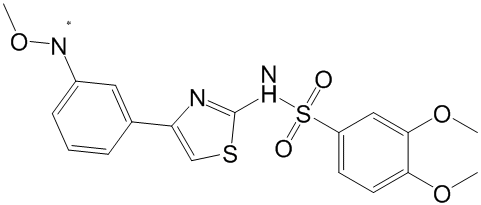All AbMole products are for research use only, cannot be used for human consumption.

Ro 61-8048 is a potent and selective inhibitors of kynurenine hydroxylase with IC50 of 37 nM. In the present study, intrastriatal injections of Ro 61-8048 (60-80 microg/hemisphere) significantly reduced the severity of dystonia in dt(sz) hamsters, suggesting that kynurenine 3-hydroxylase inhibitors may be interesting candidates for managing dyskinesias which are related to striatal dysfunction. Ro 61-8048 increases brain KYNA levels and attenuates cannabinoid-induced increases in extracellular dopamine in reward-related brain areas. In the self-administration model of compound abuse, Ro 61-8048 reduced the rewarding effects of THC and the synthetic cannabinoid WIN 55,212-2 in squirrel monkeys and rats, respectively, and it also prevented relapse to drug-seeking induced by reexposure to cannabinoids or cannabinoid-associated cues. The effects of enhancing endogenous KYNA levels with Ro 61-8048 were prevented by positive allosteric modulators of α7nAChRs.

Int Immunopharmacol. 2023 Dec;125(Pt B):111196.
Tryptophan metabolism regulates inflammatory macrophage polarization as a predictive factor for breast cancer immunotherapy
Ro 61-8048 purchased from AbMole
| Cell Experiment | |
|---|---|
| Cell lines | |
| Preparation method | |
| Concentrations | |
| Incubation time | |
| Animal Experiment | |
|---|---|
| Animal models | Male albino rats and female gerbils |
| Formulation | Suspended in 0.1% Tween-80 in water |
| Dosages | 30 μmol/kg |
| Administration | p.o. |
| Molecular Weight | 421.45 |
| Formula | C17H15N3O6S2 |
| CAS Number | 199666-03-0 |
| Solubility (25°C) | DMSO 60 mg/mL |
| Storage |
Powder -20°C 3 years ; 4°C 2 years In solvent -80°C 6 months ; -20°C 1 month |
| Related Products |
|---|
| DSPE-PEG-FA
DSPE-PEG2K-FA is a PEG derivative containing folic acid. DSPE-PEG2K-FA has a targeting effect and can bind to folic acid receptors in cancer cells. DSPE-PEG2K-FA forms micelles/lipid bilayers and can be used in research on targeted drug delivery systems. |
| Lifastuzumab
Lifastuzumab is a humanized anti-NaPi2b IgG1 monoclonal antibody. |
| GPVI antagonist 1
GPVI antagonist 1 is a glycoprotein VI (GPVI) platelet receptor antagonist. GPVI antagonist 1 inhibits collagen-induced platelet aggregation with an IC50 of 25.3 μM. |
| MPSD TFA
MPSD TFA (MARCKS-ED TFA) is a 25-amino acid peptide based on the effector domain sequence of the intracellular membrane protein myristoylated alanine-rich C-kinase substrate (MARCKS). MPSD TFA can sense membrane curvature and recognize phosphatidylserine. MPSD TFA can be utilized as biological probe to study membrane shape and lipid composition. |
| 4-Nitro-2,1,3-benzoselenadiazole
4-Nitro-2,1,3-benzoselenadiazole is a biochemical material that can be used in scientific research. |
All AbMole products are for research use only, cannot be used for human consumption or veterinary use. We do not provide products or services to individuals. Please comply with the intended use and do not use AbMole products for any other purpose.


Products are for research use only. Not for human use. We do not sell to patients.
© Copyright 2010-2024 AbMole BioScience. All Rights Reserved.
